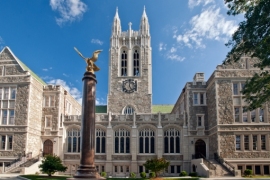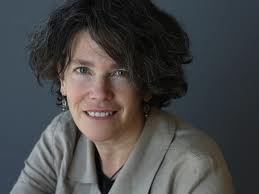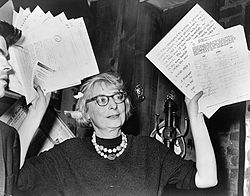Researchers at Georgetown made news this week with listings of the college majors that lead to both the plumpest and leanest paychecks. Topping the plump list was petroleum engineering (yes, there’s a major for that), followed by such practicalities as pharmacy administration, computer science, and a slew of other engineering majors. The majors with the slenderest earnings included the performing arts but mostly occupations such as social work, human services, community action, early childhood education, and counseling psychology—in other words, professions defined by helping people.
None of this is surprising, and much of it could be chalked up to the way things are, this side of the Kingdom of God. Still, the Rich Major, Poor Major lists do raise questions about our colleges and universities. Are they simply training students to slot themselves into professional growth sectors like petroleum engineering? Or are they also finding ways to prepare young people for lives and careers of service to their communities and to their world?
Recently I had occasion to speak with undergraduate students who spent the past summer doing internships in the nonprofit and public sectors. These internships are almost invariably unpaid, and most of the students said they would not have been able to take them on, without special grants made available to them by their school—Boston College. They would have been unable to forgo the summer income and come up with the money for room and board in, and travel to, places ranging from Washington, D.C. and The Hague to the Dominican Republic.
“Men and Women for Others”
I say this not to give special kudos to BC (with which I’m associated). Its civic internship program is fairly limited and no more than what you’d expect from a Jesuit institution that speaks constantly of nurturing “men and women for others.” The point is that colleges and universities need to back up their rhetoric about service and the public interest with initiatives of this kind.
What follows is my account in the latest edition of Boston College Magazine, but first—a note about “men and women for others.” It has become a buzz phrase on Jesuit college campuses, and it’s heartening to simply hear a student speak those words, regardless of how he or she chooses to put them into practice. The slogan, though, has more of a theological and social edge than many of them would suspect. Here’s the original rendering, in 1973, by Pedro Arrupe, S.J., the beloved Superior General of the Society of Jesus:
Today our prime educational objective must be to form men-and-women-for-others; men and women who will live not for themselves but for God and his Christ—for the God-man who lived and died for all the world; men and women who cannot even conceive of love of God which does not include love for the least of their neighbors; men and women completely convinced that love of God which does not issue in justice for others is a farce.
And here’s the piece about the interns:
In late May, Samantha Koss ’14 began a 10-week internship at the U.S. embassy in The Hague, Netherlands, expecting to do research as assigned and otherwise assist embassy staff. She didn’t realize the embassy was shorthanded. And so, about once a week, she found herself walking or riding her bike to the Dutch foreign or defense ministry for a démarche (defined in the dictionary as a “diplomatic representation”). Accompanied by a career foreign service officer on each occasion, Koss would engage in discussion of a U.S. policy position with a Dutch counterpart. Details are classified, but she can say the meetings dealt with matters ranging from Iran’s nuclear program to the melting Arctic ice cap. Koss usually had several days to get up to speed on an issue before the démarche session. “It’s diplomacy, basically,” says the international relations major.
For Koss—who aspires to the diplomatic corps and plans to take the notoriously difficult Foreign Service Officer Test in October—it was her dream internship. Just weeks before she was to leave for The Hague, however, reality intruded. “I didn’t have the financial means to come out here and work for free. It wasn’t going to happen,” Koss recalled with a doleful shake of the head during a Skype interview in July. She spoke from the four-bedroom house (a minimalist cube-shaped structure owned by the State Department) that she shared rent-free with another female embassy intern. The Abilene, Texas, native did not start packing her bags until mid-May when Boston College’s Clough Center for the Study of Constitutional Democracy awarded her one of its 20 Civic Internship Grants for this year.
Founded in 2008, the Clough Center aims to provide undergraduate students with opportunities to acquire “the skills of civic engagement.” Over the past four summers, the center has presented stipends to 63 undergraduates for uncompensated work in municipal, state, and federal government offices (including the courts) and in nonprofit service agencies, both domestic and international. (A similar Clough Center program underwrites internships of Boston College Law School students.)
Vlad Perju, the center’s director and an associate professor of law, points out that student interns in public service fields rarely enjoy a paycheck. “It’s a big problem,” says Perju, noting that, for the many students who need to make and save money in the summer, full-time unpaid internships are “just not doable.” To qualify for a Clough award, a student must line up an internship before seeking the scholarship. Amounts have ranged from $900 to $4900, depending entirely on how long the internship runs.
“I didn’t have too strong a Plan B,” says Elizabeth Blesson ’15, an award recipient this summer. She adds that she probably would have returned to her job of the previous three summers, filing medical records at a Long Island, New York, hospital. The Lynch School of Education student went instead to the District of Columbia Public Schools headquarters. She helped coordinate job fairs for teachers laid off because of school closings, and she participated in a weekly seminar on education reform and school leadership offered to 80 summer interns.
A student’s academic record is a key factor in deciding on a Clough award. So is the nature of the internship, which has to in some way foster what the Clough Center mission statement describes as “thoughtful reflection” on the opportunities and demands of constitutional government.
A think tank qualifies. Damian Mencini ’14 worked with the Transnational Threats Project at the Center for Strategic and International Studies, an independent, nonpartisan research center in Washington, D.C. Using news sources such as Al Jazeera television and the English-language Libya Herald, Mencini, who is from Denver, helped to track the movements of jihadist groups in a region spanning central Asia to North Africa. “We call it the arc of instability,” says Mencini, whose research will figure in the project’s coming publications. Narintohn Luangrath ’14 spent her summer helping to track the worldwide movement of migrants and asylum seekers, at Georgetown University’s Institute for the Study of International Migration. She drafted background papers on the forced migrations that followed crises such as the 2011 Libyan uprising.
Highly partisan activities, such as political campaigning, do not qualify for Clough internship support, but a responsible position with an elected officeholder does. In Trenton, New Jersey, Christopher J. Grimaldi ’15 aided Governor Chris Christie “as a medium between the Christie administration and the media,” he said. The political science major’s chief task was to draft press releases for which he researched policy issues and dug through the Republican governor’s past speeches. Other Clough interns assisted Democratic legislators from New York, California, Massachusetts, Iowa, Connecticut, and Texas, working either in Washington or in district offices.
Six Clough students went to the State Department—all (except Koss) in Washington. In early June, military threats emanated from Egypt—and that caused Andrew Ireland ’14 to drop everything he was doing at the department’s Office of Conservation and Water. The threatened target was Ethiopia, now building a dam that Egyptian leaders say could hinder the flow of water through the Nile into their country. Ireland’s supervisor asked him for a quick background paper on a conference in Cairo at which politicians spoke incautiously of bombing Ethiopia or arming its rebels. Within a day, he prepared a three-and-a-half-page summary based on press items retrieved from an unclassified Central Intelligence Agency database.
On many other days, Ireland, a biology major and international studies minor, drafted memos on illegal trafficking of tusks, horns, and fangs extracted from endangered elephants, rhinos, and tigers, mostly in Africa. His research served as briefing material for higher-ups. “The assistant secretary of state is as high as I’ve seen it go,” he said, lifting a hand above his head in a July interview by Skype from his family home in nearby Bethesda, Maryland. He was speaking of Kerri-Ann Jones, head of the department’s Bureau of Oceans and International Environment and Scientific Affairs. Ireland and 20 staff members in his office met weekly with Jones.
Ecological concerns took Alexandra Moscovitz ’15 to the Dominican Republic, where she interned for the nongovernmental Caribbean Sustainability Institute. She had been there the previous summer and, with a local potter, created a gasification stove with an 18-inch-high, oval-shaped ceramic chamber. Gasification stoves run on crop waste (seeds, leaves, and other residue) rather than firewood that requires tree-cutting. “We weren’t able to find another ceramic gasification stove, so I think we made the first,” she says, explaining that ceramic is more durable than the metal often used in stoves of this kind. Returning this summer with assistance from the Clough Center, Moscovitz helped dozens of families swap out their inefficient conventional fuel stoves for her environmentally friendly ones.
Other Clough interns were Bridget Manning ’15 at Boston-based United Planet, which links young people to service opportunities abroad; Rebecca Kim ’15 at the Supply Education Group in New York, which is piloting low-cost private schools in developing-world slums; and Daniel Ryan Cosgrove ’16 at the Bucks County, Pennsylvania, district courthouse. In the fall, all will become Clough Center Junior Fellows, with the opportunity to attend Clough-sponsored forums, meet with guest lecturers, and participate in other activities that might include contributing to the Clough Undergraduate Journal of Constitutional Democracy, published each spring.
The expectation, says Perju, is that Clough Civic Interns will “bring their experiences back to the campus” and contribute to an environment of “thoughtful and informed discussion about public matters.” But, he adds, the ultimate purpose is to help nurture “the next generation of leaders in the civic sphere.” …read more












